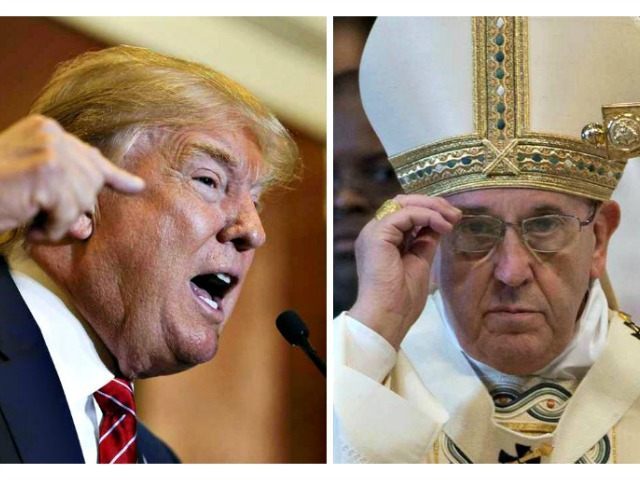In a confused and confusing article, Huffington Post writer Massimo Faggioli declares that a majority of Catholic Republicans support Donald Trump in spite of the Pope’s alleged opposition to the Republican candidate, because of their underlying racism.
“What’s most interesting,” Faggioli writes, “is that the xenophobic and nationalist candidate has earned the vote of a majority of Catholic Republicans, either unaware or uninterested in the fact that Pope Francis said, just three weeks ago during his return flight from Mexico, that Trump’s message ‘is not Christian.’”
Faggioli seems to assume, at least for the sake of his argument, that the Pope’s offhand comment to a journalist aboard the papal plane returning from Mexico somehow constituted a reasoned opinion regarding Trump’s suitability for office.
Every indication from the Vatican, however, suggests the contrary.
The day after the Pope’s comment, which referred specifically to the idea of building a wall along the U.S. southern border, Papal spokesman Father Federico Lombardi walked the Pope’s words back, insisting that the pontiff was not intending a personal judgment on Trump, or trying to tell Catholics how to vote at the upcoming election.
“This case drew a lot of attention,” Lombardi said, “but he never intended it to be in any way a personal attack or an instruction on how to vote. The Pope has made it clear that he would not meddle in the voting issues in the election campaign of the United States.”
In his rambling essay, Faggioli makes one dubious assertion after another, which can only leave informed readers scratching their heads.
The writer says that the phenomenon of Catholic Trumpism “lays bare several deep internal contradictions and trends at work in American Catholicism.” Certain trends and divisions do indeed exist within American Catholicism, but not along the lines that Faggioli suggests.
Faggioli proposes that Catholics are divided not only along social and ideological lines, but ethnic and racial lines as well. All this means in reality is that religion is not the only factor at work in people’s voting habits. Blacks and Hispanics have traditionally aligned themselves predominantly with the Democratic party, and this includes black and Hispanic Catholics as well. Nothing particularly groundbreaking here.
From this, Faggioli makes the illogical conclusion that Trump’s popularity among conservative Catholics is racially motivated. Just this week, however, an overwhelmingly white group of 36 prominent Catholic conservatives came out against Trump, which shoots Faggioli’s thesis to hell.
To say, as Faggioli does, that “the white conservative Catholic church, whose members are now clinging desperately to Trump,” are “terrified to lose ‘white supremacy’ within American society” is ridiculous in the extreme.
Moreover, Faggioli wonders aloud how Trump can earn the votes of conservative Catholics despite his “more than flip-floppy position” on the abortion issue, and concludes that the pro-life cause has dropped in importance among Catholic voters. In point of fact, however, Trump has only secured the support of many conservative Catholics by the assertion of his pro-life credentials and intentions to work as president for pro-life interests. Those unconvinced by those assertions, like the signers of the letter referenced above, have withheld their support from Trump.
All in all, the situation of the conservative Catholic electorate in the United States is far more complex and nuanced than Faggioli’s superficial analysis would suggest.
What is abundantly clear is that many Catholic Republicans, whether self-identified conservatives or not, are finding in Trump a candidate successful in business, external to the political establishment and strong in leadership.
Whether those qualities are sufficient to secure their long-term support remains to be seen.
Follow Thomas D. Williams on Twitter Follow @tdwilliamsrome

COMMENTS
Please let us know if you're having issues with commenting.